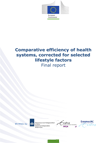 Substantial health gains can be achieved from a healthier lifestyle and if countries were on par with today's healthiest lifestyle there would be up to a 3 year increase in life expectancy. However, the effect of lifestyle on health spending remains unclear and seems to disappear when overall wealth (GDP per capita) is taken into account. These are the main conclusions of the recently published study.
Substantial health gains can be achieved from a healthier lifestyle and if countries were on par with today's healthiest lifestyle there would be up to a 3 year increase in life expectancy. However, the effect of lifestyle on health spending remains unclear and seems to disappear when overall wealth (GDP per capita) is taken into account. These are the main conclusions of the recently published study.
The study covering the EU Member States, Iceland and Norway, led by RIVM, was requested by the European Commission, who also funded the project. Its aims were to gain insight into the efficiency of the health systems in EU countries, whilst taking into account intrinsic differences in population conditions between them – in this case, health behaviours, and to see if such variations had an effect on the cost-effectiveness of health systems.
Based on data, qualitative research and a literature review, the main conclusions and insights arrived at by the researchers are as follows:
- On average, more health spending is associated with better health. This effect is clearest for countries with lower levels of spending. However, it was not possible to distinguish between the impact of health spending and GDP from the data.
- There is a substantial variation in lifestyle habits between countries.
- A positive relationship between healthy lifestyles and health outcomes exists, in particular for smoking and BMI (body mass index).
- A slightly positive relationship between unhealthy lifestyle and health care use was found.
- If all countries had health behaviours at the same level and prevalence as the countries with the healthiest lifestyles, life expectancy would increase, with increments varying from 0.4 to 3.1 years.
- Healthier lifestyles would result in a more efficient health system. However, this overlooks the fact that improvements in lifestyle are themselves reached at a cost and take time. In practice, better lifestyle behaviour involves costs. However, the review also showed that cost-effective interventions to reduce unhealthy lifestyles do exist.
- The current cross-sectional results do not support the notion that smoking, BMI and alcohol use are important confounders when establishing the comparative efficiency of the health systems of countries in Europe.
- No definite conclusions regarding the effects of more prevention on curative care spending can be drawn. However, the results support the view that substantial health gains can be achieved from a healthier lifestyle.
Given these discussion points, the main implication that arises from the current research is that better data concerning lifestyle and its effects on quality of life would be highly desirable.
Download: Comparative Efficiency of Health Systems, Corrected for Selected Lifestyle Factors (.pdf, 2.910 KB).
Download from eHealthNews.eu: Comparative Efficiency of Health Systems, Corrected for Selected Lifestyle Factors (.pdf, 2.910 KB).